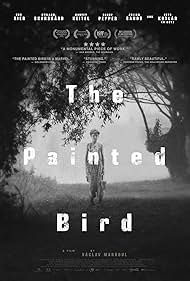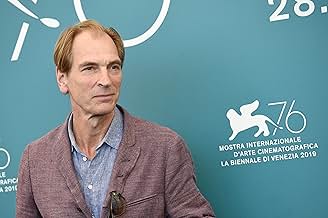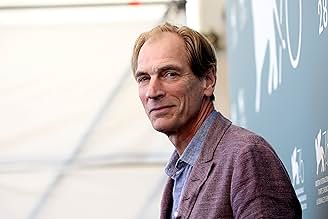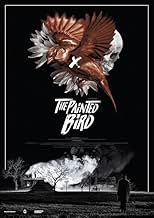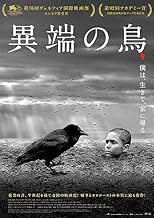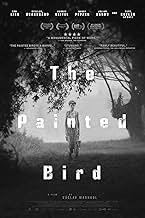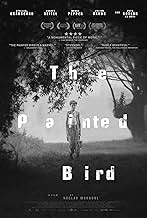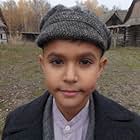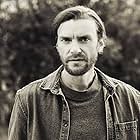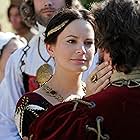IMDb RATING
7.3/10
8.3K
YOUR RATING
A young Jewish boy somewhere in Eastern Europe seeks refuge during World War II where he encounters many different characters.A young Jewish boy somewhere in Eastern Europe seeks refuge during World War II where he encounters many different characters.A young Jewish boy somewhere in Eastern Europe seeks refuge during World War II where he encounters many different characters.
- Awards
- 24 wins & 24 nominations total
Nina Sunevic
- Marta
- (as Nina Shunevych)
Marika Sarah Procházková
- Woman #1
- (as Marika Procházková)
Featured reviews
This is like a gift giver that just keeps on giving. Never once throughout the almost three hour run time was I bored. I was captivated from the very first minute right up until the final fade out.
We follow a young Jewish boy trying to survive amidst the chaos of World War II. His luck is horrible and he is subjected to a series of abuses and abusers.
Stay with him, the Painted Bird pays off and will linger in your mind long after you've seen it.
9/10
We follow a young Jewish boy trying to survive amidst the chaos of World War II. His luck is horrible and he is subjected to a series of abuses and abusers.
Stay with him, the Painted Bird pays off and will linger in your mind long after you've seen it.
9/10
'The Painted Bird' (2019) by Czech director Václav Marhoul is a very difficult film to evaluate. On the one hand, from a cinematic point of view, it is one of the remarkable performances we have seen in recent years - impeccably technical, with many interesting innovations that serve the narrative and messages of the film. It is a film about the Holocaust, an inexhaustible historical and human theme, and more precisely about the destiny of a child in those terrible times - so a story of those with which viewers identify emotionally. Here, however, the issue of this construction also appears. The series of horrors that pervade the screen hardly coexists with the inevitable sensitivity of the spectators when it comes to children's fates on screen. The film is an indictment against a war-torn dehumanised Europe, cruel or at best indifferent to the fate of children separated from their parents by the brutality of war, witnesses and often even victims of the most terrible torture and abuse. There is a complicated history around the film, which adds complexity to the whole edifice and makes it even more difficult to appreciate this film which is both difficult to watch and impossible to ignore as cinematic value and message.
Joska, the main hero, is a Jewish boy on the verge of adolescence, maybe 10-11 years old, who is sent by his parents to an aunt living in a distant place to be saved from deportation. The aunt dies suddenly and the boy embarks alone on a journey home through war-torn Central Europe. On the way he will meet different people, traumatised and impoverished by war. Few will help him, most will exploit, hit, humiliate him. The horrors he will witness and the trials this boy goes through are extreme - from violence and slavery to torture, rape and sexual perversions. Almost the entire repertoire of human cruelty is present in this film. Under these conditions, the boy is in danger to lose his humanity, his sense of good and evil, his appreciation of the value of life, and his identity. Is it still possible for him to recover and return to a normal life after individual traumas of such intensity and proportions? The elliptically beautiful final leaves this question open.
The Europe described by Václav Marhoul contains enough historical hints that allow to locate the story in the film in time in 1944-1945, the last years of World War II, but at the same time many of the scenes take place in a rural setting that could belong to any of the historical periods when Europe was torn apart by wars from the Middle Ages to the present day. Geographical area is treated similarly. The novel that inspired the film is written (in English) by the Polish Jerzy Kosinski, but the producers of 'The Painted Bird' made efforts to avoid a precise location, up to inventing a hybrid language that is used by the villagers in the film, language which combines Czech, Slovak and Polish spoken in central Europe. The cinematography signed by Vladimír Smutný is remarkable, using aesthetically and expressively black and white and the widescreen format of some of Ingmar Bergman's famous films. Much of the film's burden lies on the shoulders of child actor Petr Kotlár, who does not say a word throughout the film, but whose eyes are witnesses to the horrors outside and the suffering inside. The rest of the cast includes a consistent series of portraits, very well made, with realism and naturalism, and played mostly by Czech actors whom we do not know, but also with a few exceptions of celebrities such as Stellan Skarsgård or Harvey Keitel, excellently integrated. As in the masters' films, 'The Painted Bird' is divided into episodes, each bearing the names of some of the human or inhuman people that Joska encounters on his way. Kosinski's novel aroused controversy similar to that now aroused by the film, due to the accumulation of extreme scenes of violence and sex, but also because what was originally presented and promoted as an autobiographical story proved to be rather a synthesis of stories, gathered disparately from the testimonies of several survivors who lived the Holocaust in childhood. In a world where direct witnesses are almost non-existent and where deniers are making their voices heard louder and louder, even works of fiction such as the book and film 'The Painted Bird' must be credible. It is not the description of the extremes that seems problematic to me, but rather their gathering in a single biography. Lack of credibility also harms the emotional involvement of viewers. The temporal and geographical generalisation introduced in the film solves, I think, only partially this problem.
Joska, the main hero, is a Jewish boy on the verge of adolescence, maybe 10-11 years old, who is sent by his parents to an aunt living in a distant place to be saved from deportation. The aunt dies suddenly and the boy embarks alone on a journey home through war-torn Central Europe. On the way he will meet different people, traumatised and impoverished by war. Few will help him, most will exploit, hit, humiliate him. The horrors he will witness and the trials this boy goes through are extreme - from violence and slavery to torture, rape and sexual perversions. Almost the entire repertoire of human cruelty is present in this film. Under these conditions, the boy is in danger to lose his humanity, his sense of good and evil, his appreciation of the value of life, and his identity. Is it still possible for him to recover and return to a normal life after individual traumas of such intensity and proportions? The elliptically beautiful final leaves this question open.
The Europe described by Václav Marhoul contains enough historical hints that allow to locate the story in the film in time in 1944-1945, the last years of World War II, but at the same time many of the scenes take place in a rural setting that could belong to any of the historical periods when Europe was torn apart by wars from the Middle Ages to the present day. Geographical area is treated similarly. The novel that inspired the film is written (in English) by the Polish Jerzy Kosinski, but the producers of 'The Painted Bird' made efforts to avoid a precise location, up to inventing a hybrid language that is used by the villagers in the film, language which combines Czech, Slovak and Polish spoken in central Europe. The cinematography signed by Vladimír Smutný is remarkable, using aesthetically and expressively black and white and the widescreen format of some of Ingmar Bergman's famous films. Much of the film's burden lies on the shoulders of child actor Petr Kotlár, who does not say a word throughout the film, but whose eyes are witnesses to the horrors outside and the suffering inside. The rest of the cast includes a consistent series of portraits, very well made, with realism and naturalism, and played mostly by Czech actors whom we do not know, but also with a few exceptions of celebrities such as Stellan Skarsgård or Harvey Keitel, excellently integrated. As in the masters' films, 'The Painted Bird' is divided into episodes, each bearing the names of some of the human or inhuman people that Joska encounters on his way. Kosinski's novel aroused controversy similar to that now aroused by the film, due to the accumulation of extreme scenes of violence and sex, but also because what was originally presented and promoted as an autobiographical story proved to be rather a synthesis of stories, gathered disparately from the testimonies of several survivors who lived the Holocaust in childhood. In a world where direct witnesses are almost non-existent and where deniers are making their voices heard louder and louder, even works of fiction such as the book and film 'The Painted Bird' must be credible. It is not the description of the extremes that seems problematic to me, but rather their gathering in a single biography. Lack of credibility also harms the emotional involvement of viewers. The temporal and geographical generalisation introduced in the film solves, I think, only partially this problem.
"The Painted Bird" (2019 release from the Czech Republic; 169 min.) brings the story of a young (Jewish, we later learn) boy, never mentioned by name and simply known as "the Boy". As the movie opens, the Boy is running in the woods holding a pet, only to be brutally attacked by other boys, who also burn his pet alive. The Boy returns to home, home being a remote place with his aunt somewhere in Eastern Europe in the late stages of WWII. When his aunt dies (and he accidentally sets the place on fire), he is forced to find his way, but to where? This is the start of a long journey. At this point we are less than 15 min. into the movie but to tell you more of the plot would spoil your viewing experience, you'll just have to see for yourself how it all plays out.
Couple of comments: this is the big screen adaptation of the book of the same name. I haven't read the book, so I cannot comment how closely the film sticks to the book. To say that the book, and now the film, have been controversial would be the understatement of the year. The film is brought in chapters, each called for the person(s) in care of the young boy, maybe 9 or 10 years old: "Marta" (his aunt) start things off. The first hour of the movie is surreal and shocking on many levels, as the boy endures cruelty upon cruelty, Along the way we also watch animal cruelty, spousal abuse, and worse. Cheerier times are far away. Yet as we endure this, we also become strongly attached to the survival journey and fate of the boy: what will become of him? The movie is shot entirely in B&W, reflecting the gloomy atmosphere of remote Eastern Europe. There are some spectacular acting performances, none more so than the boy who plays the Boy, but also keep your eye out for Harvey Keitel, yes THE Harvey Keitel, playing a priest who takes the Boy under his wings for a while. BEWARE: there are a number of disturbing scenes in the film, and to say that this isn't for the faint of heart would be the understatement of the year. Yet if you can handle it, you are in for a WILD and moving but bleak tale of a young boy's WWII survival drama, the likes of which you surely haven't seen before.
"The Painted Bird" premiered to controversy and critical acclaim at the same time at last Fall's Venice Film Festival. It opened this weekend at my local art-house theater here in Cincinnati, and I couldn't wait to see it. The theater is adhering strictly to CDC guidelines in this COVID-19 pandemic. Not that it mattered as the Friday early evening screening where I saw this at turned out to be a private screening, as in: I was literally the only person in the theater. If you are in the mood for a grim and bleak but extraordinary tale of what trying to survive WWII might've looked like for a young Jewish boy, I'd readily suggest you check this out, be it in the theater (if you can), on VOD, or on DVD/Blu-ray, and draw your own conclusion.
Couple of comments: this is the big screen adaptation of the book of the same name. I haven't read the book, so I cannot comment how closely the film sticks to the book. To say that the book, and now the film, have been controversial would be the understatement of the year. The film is brought in chapters, each called for the person(s) in care of the young boy, maybe 9 or 10 years old: "Marta" (his aunt) start things off. The first hour of the movie is surreal and shocking on many levels, as the boy endures cruelty upon cruelty, Along the way we also watch animal cruelty, spousal abuse, and worse. Cheerier times are far away. Yet as we endure this, we also become strongly attached to the survival journey and fate of the boy: what will become of him? The movie is shot entirely in B&W, reflecting the gloomy atmosphere of remote Eastern Europe. There are some spectacular acting performances, none more so than the boy who plays the Boy, but also keep your eye out for Harvey Keitel, yes THE Harvey Keitel, playing a priest who takes the Boy under his wings for a while. BEWARE: there are a number of disturbing scenes in the film, and to say that this isn't for the faint of heart would be the understatement of the year. Yet if you can handle it, you are in for a WILD and moving but bleak tale of a young boy's WWII survival drama, the likes of which you surely haven't seen before.
"The Painted Bird" premiered to controversy and critical acclaim at the same time at last Fall's Venice Film Festival. It opened this weekend at my local art-house theater here in Cincinnati, and I couldn't wait to see it. The theater is adhering strictly to CDC guidelines in this COVID-19 pandemic. Not that it mattered as the Friday early evening screening where I saw this at turned out to be a private screening, as in: I was literally the only person in the theater. If you are in the mood for a grim and bleak but extraordinary tale of what trying to survive WWII might've looked like for a young Jewish boy, I'd readily suggest you check this out, be it in the theater (if you can), on VOD, or on DVD/Blu-ray, and draw your own conclusion.
A young Jewish boy and the extreme abuse (quite hideous, alarming at times) and suffering inflicted upon him during WWII by some exceptionally evil and wicked people; slightly loses traction with a few too many frying pan fire cycles to emphasise the point, a shocking experience nonetheless, albeit a very long one. Whether the world still needs this kind of stylisation of the effects of war remains debatable, as does its impact on the memories and emotions already formed over so many years and by so many.
Heavy. It's a series of chapters displayed by a photography both stunning and merciless. Human beings here are foundamentally cruel (with a couple of exceptions) and cruelty flows from the oppressor to the oppressed. The movie reminds us about that.
The ending has being discussed, but I think that, just maybe, the protagonist can still hope for a better future.
Storyline
Did you know
- TriviaIn the 1960s, writer Jerzy Kosinski had become famous in Manhattan literary circles for his astonishing tales about the brutalities he had allegedly suffered during the Second World War. Abandoned by his parents at the age of six, he claimed he had roamed the countryside alone, witnessing rape, murder, and incest, constantly fearing for his life. Kosinski turned those stories into his first novel, "The Painted Bird", which, for a time, was considered a major work of Holocaust literature. Kosinski's claims were later debunked when it was revealed that he and his parents had all been sheltered by religious Poles who had never handed him over to the Nazis.
- GoofsAfter the old man died, Lubina rolled him face down in his grave. The next shot he lies face up.
- ConnectionsFeatured in CT na MFF Karlovy Vary 2019: Nabarvené ptáce (2019)
- SoundtracksFür Elise
Music by Ludwig van Beethoven
- How long is The Painted Bird?Powered by Alexa
Details
- Release date
- Countries of origin
- Official sites
- Languages
- Also known as
- Painted Bird
- Filming locations
- Production companies
- See more company credits at IMDbPro
Box office
- Budget
- CZK 175,000,000 (estimated)
- Gross US & Canada
- $1,460
- Opening weekend US & Canada
- $452
- Jul 19, 2020
- Gross worldwide
- $659,535
- Runtime2 hours 49 minutes
- Color
- Sound mix
- Aspect ratio
- 2.39 : 1
Contribute to this page
Suggest an edit or add missing content

